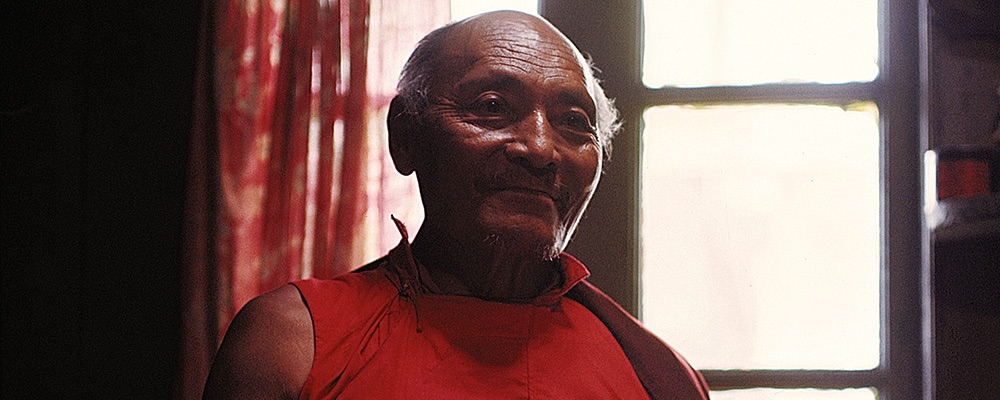
Kyabje Kangyur Rinpoche (1897-1975), one of the great Tibetan teachers of the twentieth century.
Leaving aside a promising career in molecular biology, Matthieu Ricard chose instead to become a Buddhist monk and has never regretted it. French interpreter to the Dalai Lama, today he travels the world in an effort to bridge the gap between East and West. Alhhough he is trying to distance himself from ego, he is still troubled by the predominance of this notion in the Western mindset.
Mr. Ricard, you were born in 1946 but you say that your real life only started on June 2, 1967. What happened on that day?
That’s when I met my first teacher, the wise Kangyur Rinpoche. I had just arrived in Darjeeling, on my way to the Himalayas. I was living in a Jesuit mission when Kangyur Rinpoche’s son came to pick up the small monthly allowance given to him by a French doctor. I went along to meet Kangyur, who was living in a tiny wooden hut with his wife, two daughters, one of his sons and a calligrapher copying texts. Leaning against a window, the 70-year-old was beaming with kindness. I had no idea what was going to happen to me but I stayed there for three weeks, sleeping on the floor, engaged in his teaching from the moment we woke up.
How did you know he was a master?
There was a special strength, a tranquility and a love difficult to describe, emanating from him. Despite the language barrier, I could sense his perfection. He showed great wisdom, a perfect human love – not gentle and superficial kindness, but something generous, compassionate. One can feel this “radiation”, as the Dalai Lama put it, totally different from what we usually encounter. These Tibetan masters are the image of what they preach. Even after many years, during which I got to know him and others better, the feeling of coherence between words and actions remained.
As a young man, you already knew many impressive intellectual personalities invited at your home by your father, the philosopher Jean-François Revel, and your mother, the artist Yahne Le Toumelin.
Yes, many famous philosophers, mathematicians, musicians, painters, scientists, comedians, thinkers, came to our house. My mother, a very good cook, would cater to everyone. This environment was certainly rewarding in many ways, but it never really enticed me: I never felt the desire to master mathematics like X or play the piano like Y. On the contrary: I did not want to be like them. Take a hundred gardeners, a hundred philosophers, a hundred musicians, the result is always the same mixture of wonderful, boring, difficult, odious people; I found it disconcerting. There was no example for me in there. The talent or genius they displayed in their field was not seldom accompanied by simple human virtues such as altruism, kindness or sincerity. I did not want to admire anyone just for his or her abilities, but rather as a whole human being, as someone we really enjoy being with. But it did not happen very often.
How did you come to Buddhism?
In my youth, I developed a keen interest in spirituality. My mother and my uncle, the navigator and adventurer Jacques-Yves Le Toumelin, had written several books about it, but without any applied practice. When a filmmaker friend showed me the material he had collected for a documentary on Tibetan masters, I immediately knew that they were the ones I was looking for! In 1967, equipped with a little English dictionary as I had only learned Latin and Greek at school, I went to Darjeeling; there I met Kangyur Rinpoche, my first and most impacting teacher.
“In meditation, we learn to recognize the feelings that cause suffering, such as anger, pride or jealousy, to distance ourselves from them and eventually to dissolve them.”
Who was Kangyur Rinpoche?
Kangyur Rinpoche was known as Master of Tipitaka: he recited thirty times the entire 103-volume collection of Buddha’s teachings. How extraordinary! He was not a monk like the Dalai Lama; he had a family. Two of his sons are now my teachers. one of them is the same age as me, the other is fifteen years younger. Oral transmission continues to play a big role in Buddhism.
Extracted from an interview by Anja Jardine for Neue Zürcher Zeitung :